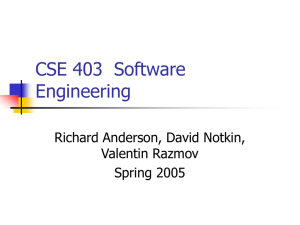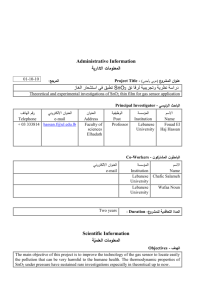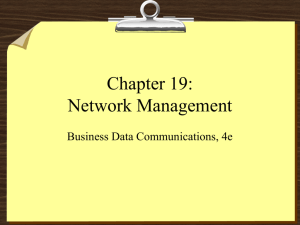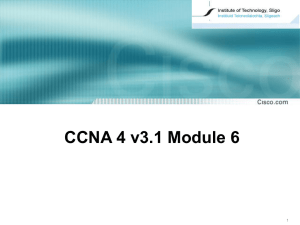pptx
advertisement
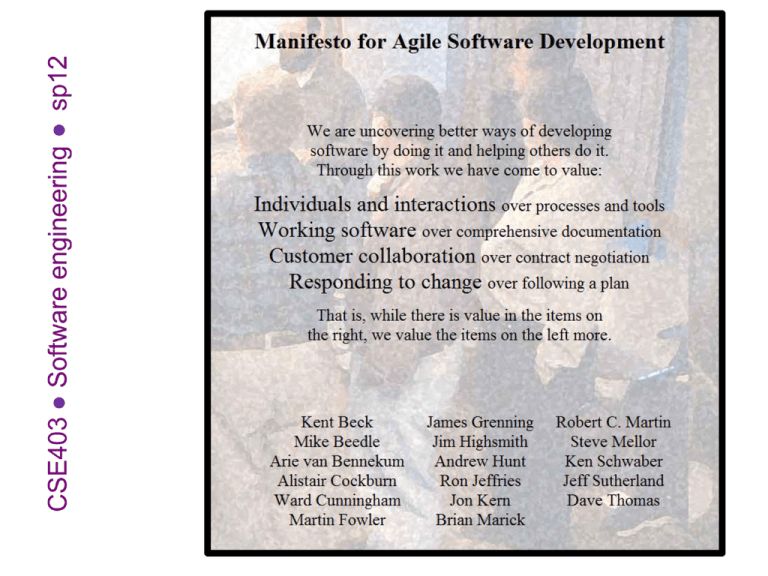
Genuine differences among agile approaches in scope and in content – but the commonalities are more important for now CSE403 Sp12 2 A core issue – rarely explicit • Developers write programs – static descriptions • Customers care about the behavior of those static descriptions • This is a huge gap, especially when we modify a program with the objective of achieving a new behavior – Might change the program to fix bugs – Might change the program to meet new or better understood customer needs • Software is discrete – a small change in the program can cause a disproportional change in the behavior CSE403 Sp12 3 Feedback loops in agile Customer-team • Frequently interactions and iterations between the customer and the team decrease the potential for big jumps in expected behavior • Such jumps in behavior would, of course, often demand big changes in the program CSE403 Sp12 Team-team • Ensuring that changes to a program do what is intended is hard • A tighter loop between the changes to the program and the changes to behavior decreases the potential for them to become significantly out of whack 4 Bounding divergence • In other words, a lot of agile – and indeed a lot of software engineering techniques, methods, tools, and approaches in general – try to bound divergence – The divergence between the behaviors provided by the software and the behaviors desired by the customers [building the right system] – The divergence between the behaviors provided by the software and the behaviors the development team thinks (wants) the program will provide [building the system right] • Another example from around the mid-1990’s was Microsoft’s nightly builds (or sync-and-stabilize) – at the very least, don’t get too far from an executable program! CSE403 Sp12 5 Concrete example of the “past” • DOD-STD-2167A, MILITARY STANDARD: DEFENSE SYSTEM SOFTWARE DEVELOPMENT (29 FEB 1988) [S/S BY MIL-STD-498]., This standard establishes uniform requirements for software development that are applicable throughout the system life cycle. The requirements of this standard provide the basis for Government insight into a contractor's software development, testing, and evaluation efforts. – This was the basis for all US government procurement of software – Thousands of pages of specifications, documentation, diagrams, etc. – valuable in some cases, but not in all http://www.agile-process.org/ • “We realize the way a team works together is far more important than any process. While a new process can easily improve team productivity by a fraction, enabling your team to work effectively as a cohesive unit can improve productivity by several times. … • “The most brilliant programmers alive working competitively in an ego-rich environment can’t get as much done as ordinary programmers working cooperatively as a self disciplined and self-organizing team. You need a process where team empowerment and collaboration thrive to reach your full potential.” Note: agile and flexible does not equate to code-and-fix Extreme Programming (XP) Kent Beck, mid-1990’s • Focuses on the customer, the development team, and the need for change • A set of short development cycles instead of a long one • Changes are desirable and unavoidable, so plan around that notion rather than pretending to define a stable set of requirements a priori • Four activities: coding, testing, listening, and designing CSE403 Sp12 9 XP: Coding • “It’s the source, Luke!” • It’s a way to communicate both with the computer and also with other developers in a more precise way XP: Testing • If a little testing is good, a lot of testing is better • Unit tests essentially represent the specification of a feature works • When all the tests pass, the coding is complete • All code is tested as it is developed XP: Listening • The developers have to listen, carefully, to the customers • Not only to figure out what to build, but also to provide clear information about the technical aspects and costs of how the problem might be solved (or not) • User stories (roughly, use cases) are a key vehicle for this • The Planning Game – meeting once/iteration (often weekly) with both release planning – customers and developers determine what features should go in upcoming releases – and iteration planning – developers defines the tasks and activities to achieve the releases – Intent of planning is to steer the project in the right direction XP: Designing • “Good design will avoid lots of dependencies within a system; this means that changing one part of the system will not affect other parts of the system.” • In XP, this goes with the notion of simplicity – don’t anticipate change but when you see an actual need for abstraction, do it We’ll look next week, and in Reading III, at the more common notion of information hiding and anticipating change XP Values • Simplicity: “We will do what is needed and asked for, but no more. … We will take small simple steps to our goal and mitigate failures as they happen. We will create something we are proud of and maintain it long term for reasonable costs.” • Communication: … • Feedback: “We will take every iteration commitment seriously by delivering working software.” • Respect: “Everyone gives and feels the respect they deserve as a valued team member. Everyone contributes value even if it's simply enthusiasm. Developers respect the expertise of the customers and vice versa. Management respects our right to accept responsibility and receive authority over our own work.” • Courage: “We will tell the truth about progress and estimates. …” CSE403 Sp12 14 CSE403 Sp12 15 12 in four categories [Previous slide has 13, including refactoring] • Fine scale feedback • Shared understanding – Pair programming – Planning game – Test driven development – Whole team – Coding standard – Collective code ownership – Simple design – System metaphor • Continuous process • Programmer welfare – Continuous integration – Design improvement – Small releases CSE403 Sp12 – Sustainable pace Is it XP unless it follows all practices? 16 Comparison to SCRUM? Extra credit CSE403 Sp12 17 WebQ feedback: easy comments I think it's too early to really tell. meeting with TA, teaming up with people The website is pretty poorly formatted-- that's probably the most/only annoying thing so far. It is okay. Fun times with a big project CSE403 Sp12 20 --Fun time WebQ feedback: other comments I have a way to manage project *code*, but I'd like an easy way to keep track of tasks for members in my group. I'd like to be able to assign tasks to members, track due dates, keep a work log history, etc. And it should have a sexy UI. And it should be free and come with lots of awesome. Thanks. I am a little bit confused so far about what the exams will be like. Is it going to be about the readings? Is it going to be about the topics discussed in lecture? Is it going to be multiple choice? I don't have a rough idea about what I am gonna learn throughout this course. The readings are way too long and thorough, and because of that it is less useful. A more concise article would be more useful, as one would be reading only the important points, which would be easier to understand, as we read exactly what is important. CSE403 Sp12 21 WebQ feedback: other comments So far the class seems to be going fairly well. The lectures are moving a little slowly though. Other than that, I have no complaints or suggestions. I am a little bit confused so far about what the exams will be like. Is it going to be about the readings? Is it going to be about the topics discussed in lecture? Is it going to be multiple choice? I am concern about the midterms and how we will be tested. CSE403 Sp12 22 Week 2 -3 Monday Tuesday •Requirements • Group •… meetings • Design • Group meetings Wednesday Thursday Friday • Team work and structure • SRS • Agile informatio n • Design • Section • Design • Weekly team summary: due Friday @ 11PM on DropBox by each PM • SRS: due Tuesday April 10 @ 11PM on DropBox by each PM Any questions CSE403 Sp12 23
